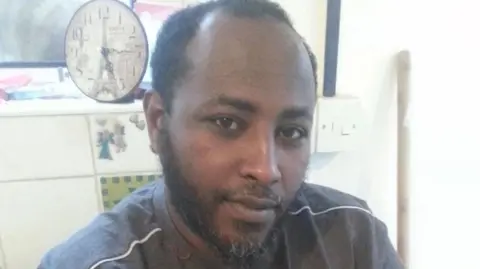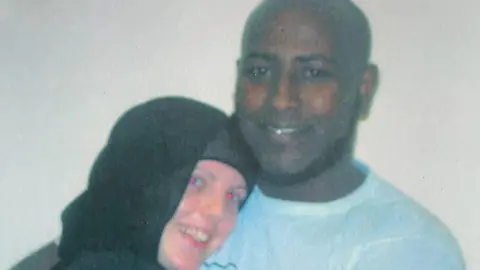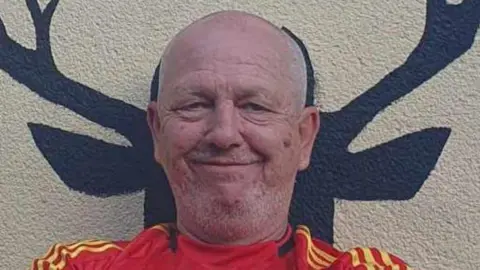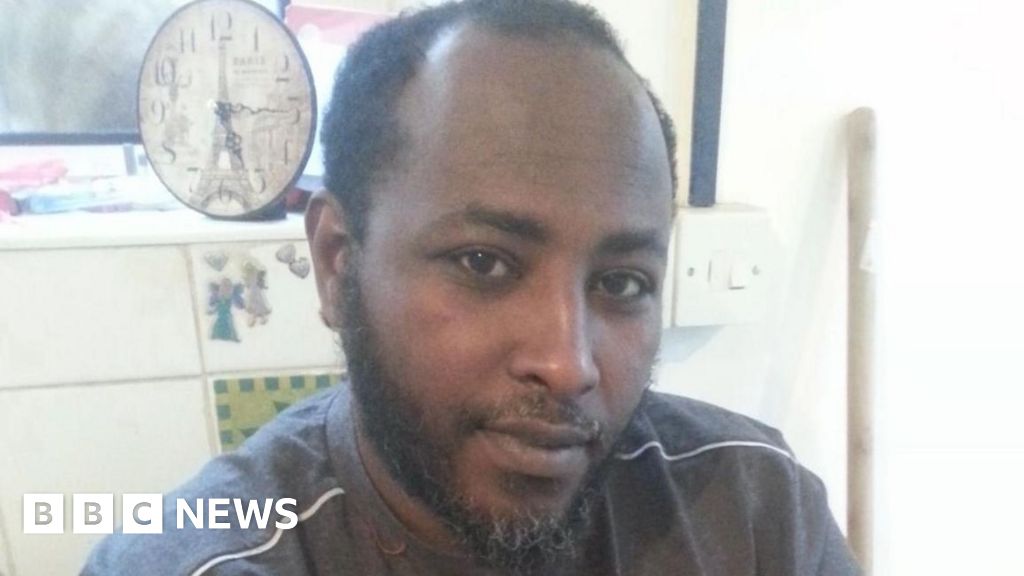 Bernadette Emerson
Bernadette EmersonA prisoner who has served almost five times his original sentence for a laptop robbery still has no prospect of being released.
Abdullahi Suleman, 41, from Cardiff, is still in prison after being handed an Imprisonment for Public Protection (IPP) sentence in 2005.
These were handed out between 2005 and 2012 to try and keep the most dangerous criminals behind bars, but scrapped after criticism, such as the fact less serious offenders were getting caught up in the provision.
Suleman is one of the 2,734 prisoners who remain incarcerated after receiving an IPP sentence – 1,132 of whom have never been released, according to the latest data.
BBC Wales spoke to the families of two men and one released prisoner who say their lives have been ruined by the sentences which still hang over them, despite the law since being scrapped.
Suleman was given a minimum of three years and 276 days in prison in 2005, when he was 22.
“He calls them the stolen years,” is how his wife Bernadette Emerson describes the time that has followed.
As well as missing his three children growing up, Suleman is also not getting treatment for bipolar disorder, which he was diagnosed with in 2004, and has played a major role in him remaining in jail.
A Ministry of Justice spokesperson said “it is right” the sentences were abolished, adding: “The Lord Chancellor is committed to working with organisations and campaign groups to ensure the appropriate course of action is taken to support those still serving IPP sentences.”
 Bernadette Emerson
Bernadette EmersonBut Suleman, who fled war in Somalia as a child to build a new life, remains in prison.
The trained plasterer was first released in 2011, but suffered a mental health breakdown and was treated in hospital.
After being discharged, he was told that missing any hospital appointments or failing to take his medication would result in being recalled to prison.
Two-and-a-half years later he was recalled for four months, and since then he has been recalled another three times for not complying with his mental health treatment conditions.
In 2017, Suleman was recalled to prison for seven years for missing a hospital appointment and at his last three parole hearings he was denied release.
“He is not going to get treatment. He is going to get punishment,” Ms Emerson said, adding that his licence conditions have created a “cycle”.
“I feel suffocated by the thought of knowing there’s no end to it,” she added.
IPP prisoners have to complete rehabilitation courses to sit their parole hearing under the so-called IPP Action Plan.
Ms Emerson said the action plan “exploits” her husband’s mental health.
He continues to be denied release because of failure to complete a two-year treatment programme for people with personality disorder due to long waiting lists or “failure to engage”, she said.
 Shirley Debono
Shirley DebonoShaun Lloyd was also handed an IPP sentence, aged 18.
He was jailed for two years and nine months for stealing a mobile phone in the street in Cardiff and served nine years in prison before being released on licence.
Since 2014, Lloyd has been recalled to prison every 18 months and been detained for close to a year each time.
He is currently incarcerated.
“I don’t condone what he did. What he did was wrong and to go to prison was right,” his mother Shirley Debono said.
But his IPP sentence has also ended up being “a life sentence through the back door”, she said.
The continued detainment led to Lloyd becoming depressed and suicidal, Ms Debono said, and he became addicted to prescription opioids.
He has struggled with addiction and was recalled for lapses in drug use.
 Michael Roberts
Michael RobertsMichael Roberts received an IPP sentence in 2006, aged 33, for armed robbery and was told he had to serve a minimum of three and a half years in prison.
Roberts, from Barry, Vale of Glamorgan, said he already had 24 convictions for 134 offences prior to that, mainly for motoring offences.
He was released five years later.
He has been recalled to prison five times for spells lasting between seven and 14 months since.
The first recall happened two months after his release as a result of further allegations, for which he says he was found not guilty.
Now working as a roofer, he has been out of prison since May and was previously in the community for seven years without being recalled.
His two youngest children were put up for adoption aged 18 months and seven years a result of a recall, and he said he has had no contact with them since.
Another child is in foster care, while he is in contact with his older children and grandchildren.
Roberts recognises he committed a serious crime which warranted a big sentence, and already had a criminal background.
“What I did to those people was bad. We had no business, no right to be doing that to those people,” he said.
“I can never justify what I did. It was a stupid decision… but I’ve paid my price.”
He also said some IPP sentences were justified for individuals who pose a significant risk.
“There are some seriously dangerous people who warrant IPP sentences,” he said.
But he argued his IPP sentence had made it impossible for him to move on with his life.
“For me, it’s a very difficult pill to swallow right now,” Roberts said.
“I’m now a 51-year-old man. I’m a grandad. It’s destroying my children’s lives.
“I’d give anything to have them back.”
What is an IPP sentence?
The IPP sentence was introduced that in 2005 to keep serious offenders in prison for as long as they posed a significant risk to society.
It imposed a minimum amount of time for offenders to serve, but no maximum or end date.
IPP prisoners can only be released, on licence, if the Parole Board believes they do not pose a risk to public safety.
The sentences were scrapped in 2012, but not cancelled retrospectively.
Around two-thirds (64%) of the “unreleased” IPP prisoners who have served their minimum tariff period have been held for at least ten years beyond the end of their tariff.
Criminal justice experts and campaigners have criticised the legislation and Labour peer Lord Blunkett, who introduced IPPs in 2005, has said “radical” reforms are needed.
A committee in 2022 recommended that all remaining IPP prisoners were resentenced, but said such a task would be “administratively complex” and that advice was needed on the practical implementation of the resentencing.
 Shirley Debono
Shirley DebonoMs Emerson and Ms Debono are campaigning for resentencing with the IPP Committee in Action, which was founded by Ms Debono.
“We need to manage Shaun in the community,” she said.
“He basically served 20 years – because you’re still an IPP prisoner on the outside.”
Ms Emerson said Suleman now has post-traumatic stress disorder.
“It psychologically really affects him that he has lost so much of his adult life to this sentence,” she said.
“It is really traumatising and torturous that I am helpless to help him.”

